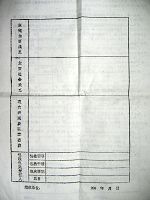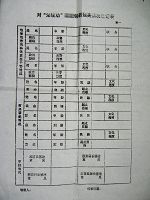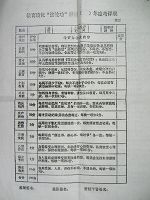Systematized and Institutionalized Persecution in Gansu Prison
(Clearwisdom.net) In recent years, based on their personal experience, a large number of Falun Gong practitioners have made complaints about brutality in Gansu Prison, exposing its systematic and institutionalized persecution.
Under the command of the Gansu Province 610 Office, the perpetrators at Gansu Prison Administration Bureau have established four special “Transformation Bases.” The dedicated locations for these bases are Tianshui Prison, Lanzhou Prison, Gansu Province Women's Prison, and Jiuquan Prison. They deployed guards from different prisons, invited thugs from other provinces and Chen Bin from Xian, providing them with comprehensive training to enable them to become professional guards for the sole purpose of persecuting practitioners. To elevate the level of persecution, they play training videos in other prisons on how to persecute practitioners. Every year, the provincial Political and Legal Committee and 610 Office sent people to the “transformation bases” to supervise the “transformations,” issue “transformation” quotas, and reward the guards who executed the persecution well.
The Institutional Persecution of Falun Gong Practitioners in Gansu Prison
(Note: we will use Jiuquan Prison as an example)
Basic Information Questionnaire for Persecution of Falun Gong practitioners (part)
Step One, Preparation: Investigate and Decide on a Strategy
As soon as practitioners enter the prison, prison authorities arrange for four to eight personal monitors to watch each practitioner in an isolated cell. They initiate conversations with the practitioner to obtain basic personal information, including the cultivation situation, personality, education, social background, psychological weaknesses, and the attitude of other family members towards Falun Gong. This process sometimes lasts one to two months. They finalize the monitoring group members and guards and establish a dedicated file on the practitioner including: the verdict, basic personal situation, social relations, health, the information collected by the assigned monitors, the “transformation” plan, and the “reform” agreement signed by the threatened and deceived families of practitioners.
Monitors' Registration Form
Step Two, “Attacking the Fort:” Violent Brainwashing
Practitioners are first isolated in a solitary cell and forced to watch videos slandering Falun Gong repeatedly. The monitors read them books slandering Falun Gong. Every half hour, monitors record the practitioner's situation, which is then reviewed and signed by the guards. The recording will last until the practitioner leaves. All records are kept in the Anti-evil-cult Section. If the practitioners protest, they will be deprived of sleep. They will be yelled at, beaten, handcuffed behind their backs, held in solitary confinement, and tortured in other ways. They must write a “thought report” every day. If they do not write what is expected of them, they will have to re-write it repeatedly. During this stage, the guards are unscrupulous and do everything to continue the persecution (the longest period has been more than two years). Their ultimate goal is to force practitioners to renounce their faith. During this stage, the contents of the files include multiple “thought reports,” “Four Statements,” exposing and criticizing materials, and the written statements by the guards and monitors.
The Annual Evaluation Form of the Persecution of Falun Gong practitioners
Step Three, the Consolidation Phase: Speech and Behavior Constraints, Forced Slave Labor
During this period, practitioners are detained in groups of 20. Each one has two monitors, one on each side. The “study” arrangement is to read books praising the Chinese Communist Party (CCP). Practitioners are forced to write notes, otherwise, they will be “reformed” by a group of monitors. During family visits, they are monitored and recorded. The practitioners are forced to say they are being educated kindly by the guards and how nicely treated they are in the prison, otherwise, their families will not be allowed to visit them and they will be disciplined. They are not allowed to have conversations with others in the prison. They have to attend different “educational” meetings and finish their “political homework.” They are also forced to take on slave labor, the dirtiest, most tiring work, in order to prove that they have “shown repentance.”
The length of this stage is determined by the monitors and guards based on each individual's situation. The files in this stage include monthly thought sharing, learning experience sharing, copies of practitioners' letters, phone records, completion of the political homework, and the reports written by monitors regarding practitioners' work and reform situation.
Step Four, The Acceptance Phase: Three-layered System with Responsibilities at Each Layer
The “Three-layered system” refers to the prison ward, prison, and prison administration bureau. First, the prison ward needs to provide different materials, files, and inspection reports to the Anti-evil-cult Section. The Anti-evil-cult Section examines the reports and provides a detailed acceptance testing evaluation form. Guards ask questions unannounced, trying to force practitioners to say something against their will. They keep pressuring practitioners to say that they are voluntarily “transformed.”
If the acceptance testing fails, the prison wards immediately put the practitioner through another round of the “attacking the fort” campaign. After the inspection is completed and the materials are submitted to the Anti-evil-cult Section, the Prison Administration Bureau needs to make an inspection. After this is completed, they submit it to the provincial 610 Office and notify the prison that they are releasing the practitioner through the “reduction in sentence and released for parole” examination procedures. During this period, practitioners' files include the inspection reports submitted by prison wards and the prison, examination and testing score sheets, and copies of the orders issued by the Prison Administration Bureau.
Step Five, Reporting “Reduction of Sentence and Released on Parole”
The reports of “reduction of sentence and released on parole” submitted for practitioners all have to go through the approval process by the Prison Administration Bureau. Then they need to be submitted to the Provincial Political and Legal Committee and the 610 Office for approval and recording. After that, it will be sent to the local court for a ruling.
Step Six, After Leaving the Prison, Practitioners Continue to Be Monitored
After the prison notifies the local 610 Office that the practitioner is released, they transfer part of the practitioner's files to the local 610 Office for them to take over the monitoring responsibilities. Prison personnel often pay regular so-called “visits” to practitioners to test the effectiveness of their regime.
In summary, the brutal persecution of practitioners is a group persecution by the CCP and led by the Political and Legal Committee and the 610 Office. In the past ten years, it has highlighted the systematic, institutionalized, fine-tuned, and concealed persecution.
Key persecutors:
Jiuquan Prison of Gansu Province
Ji Peirong, head of the prison, +86-937-2611108, deputy head of the prison: +86-937-2614995
First Prison Ward: +86-937-2663188
Sixth Prison Ward: +86-937-2632690
Guards and employees in Jiuquan Prison, personal telephone: +86-13893705522, +86-13893754887, +86-13893740350
Please refer to the original Chinese article for more people and offices involved in the persecution.


